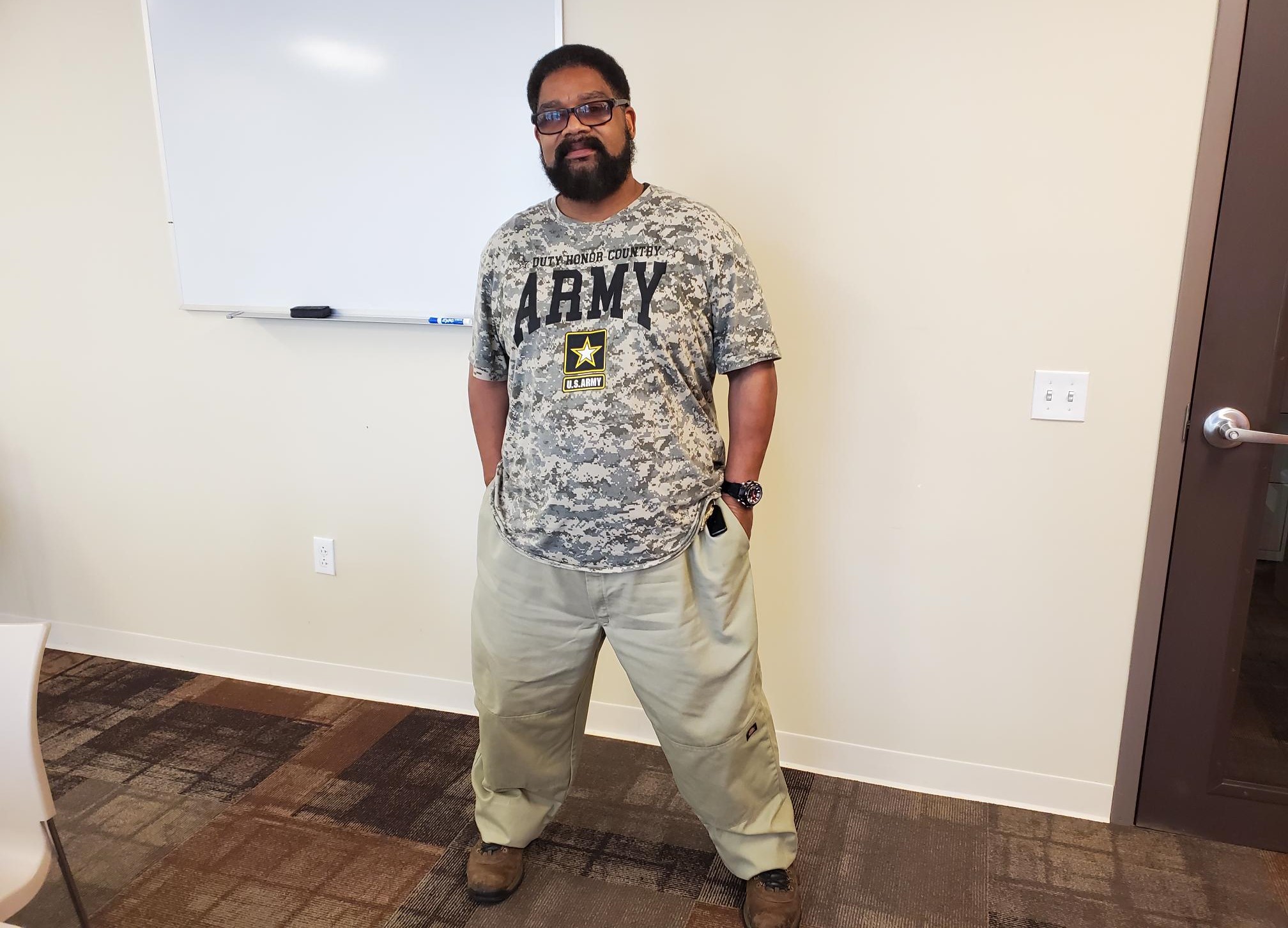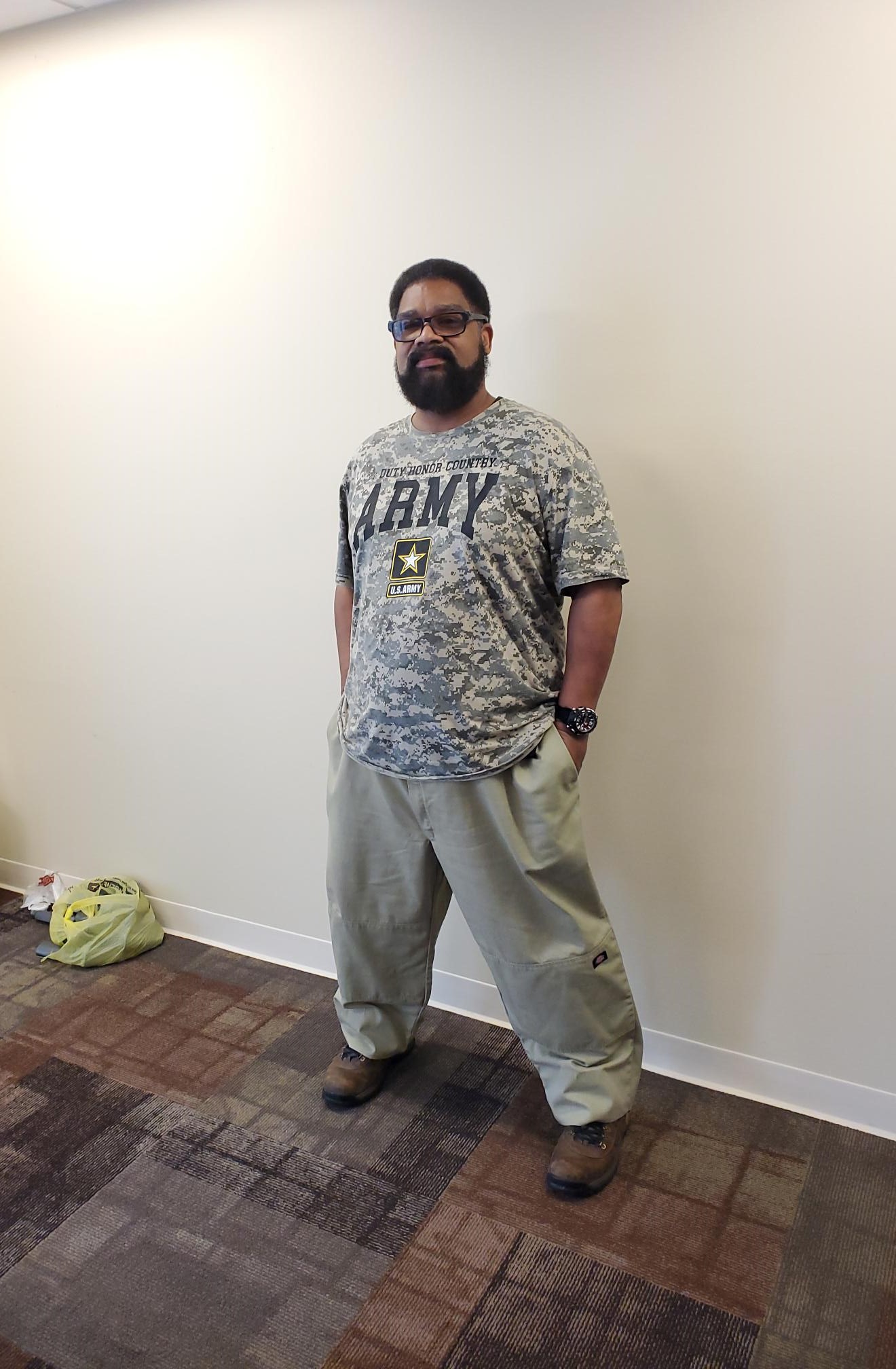PROTECTING VETERANS WITH TAILOR-MADE RESOURCES AT THE ST. LOUIS VETERANS RESIDENCE

Not all problem drinkers spiral out of control in their teens, 20s or 30s.
It took Victor, a college-educated Army Veteran, until his 40s to lose everything, after a longtime professional career as a Barnes Jewish Center medical technician who had been supporting himself for years.
“I remember where I was, drinking [New] Amsterdam [vodka] a lot,” Victor, 54, said on a recent spring afternoon. “All of my 20s, I don’t think I touched a drop. My 30s, I could drink social, maybe.”
His job and family life crumbled in the wake of Victor’s mother falling ill with cancer and then passing away. Victor embraced an “isolated” drinking lifestyle and resigned his job at Barnes Jewish.
“It would have taken me a lot longer if I had gotten fired -- and to get back,” he said. “It just would have been too much negativity. I said I’ve got to do something about this first. I was always telling people do what’s in front of you, and then you’ll get the basement cleaned out.”
Victor’s sister, with whom he was living at the time, required him to stop drinking as a condition of his staying there. The Veteran, caught in ropes of difficult decisions, found himself unhoused, looking for housing assistance.
This brought him in 2018 to The Salvation Army’s Veterans Residence, located at 2935 Locust Ave. in St. Louis, at the suggestion of a local case worker, Elizabeth, with whom he was working at the time.
Veterans have access to detox resources, and the treatment by medical professionals and individualized case workers, all of which were available at the Salvation Army’s next-door Midtown Service and Treatment Center facility, advanced with addiction technology.
Victor, ruled legally blind, said he served limited time in the military. But, as a Veteran, he was entitled to protections and benefits, which he took a while to accept as an entitled recipient of them, with his honorable discharge distinction.
“I really didn’t think I had a right to it. I never fought in a war,” Victor said. “I didn’t know that these services were available to me even after I left the service for a long time. I wasn’t looking for it.”
Victor’s journey in The Salvation Army also included staying a month at Family Haven shelter at 10740 Page Blvd. in St. Louis.
Family Haven takes a limited number of Veterans because it primarily shelters children and women. As with other Veterans, his successful participation in Family Haven led to a spot in Veterans Residence, which serves male and female Veterans.
They can be a population group with a higher representation of mental illness and injury. The depression rate for Veterans is higher than for non-Veterans, that some estimates are at several times as much.
Veterans have been under-represented in social protections for years.
The newest statistics suggest that poverty is higher among non-Veterans than Veterans, who are at about 8% in poverty.
Finances may be rocky, however, for Veterans, who are estimated that half of their population spends more than half their income on housing costs.
The Salvation Army’s Veterans Residence offers low-income leased housing below market value to assist in this area.
The 48-single-unit, three-story Veterans Residence has new appliances, solid-surface countertops, and a communal computer lab. The goal is to create homelike surroundings for Veterans, as they reintegrate into the society that they risked their lives to protect.
Some Veterans live in Salvation Army transitional or temporary housing, where a greater degree of independence comes with living in apartments offsite. Transitional or temporary housing can be a next step for some Veterans reintegrating into society.
“The process at Family Haven, with us being Veterans, they treated us so well,” Victor, who has two adult sons, said. “I liked the structure of it. The way they have it set up, there are only a certain number of Veterans. You have a dorm with a roommate. It was that big.”
The Salvation Army’s Holly helped find the right place for Victor, after he had been through the detox program once and relapsed.

Many comforts and support are extended to Veterans at the Veterans Residence, such as group meetings for peer support. Resources extend to a residence include a small stipend every few weeks, food donated from the community, job assistance with resumes and interviews, and case management.
The system helps Veterans leave the facility with a job, a, and a new place to live. Strengths and weaknesses are analyzed, in addition to walking Veterans through manageable goals, such as a trip grocery shopping. Case managers may also help to reconnect Veterans with estranged family members and available disability benefits.
“I was really overwhelmed,” Victor said. “I was just looking around like, ‘I have never seen anything like this,’ where you’re not worried about your day-to-day living expenses and activities. After I started working, I started going to AA. I wanted to make sure that I was taking care of the things that I was supposed to take care of.”
He added, “I was like just like, other than feeding you – you have to feed yourself.”
Victor says his first drink was at age 10. Along with a bad drinking experience at 18, and his father’s alcoholism, the childhood experimentation with alcohol didn’t take hold. To hear Victor describe his first drink, it is with enough detail to suggest a lifelong love for the process.
“We would go to my aunt’s house, and they had a keg,” he said. “They let us drink a cup of beer and all that. Me and my brothers kept getting thirsty. We didn’t know anything about alcohol. We were 10. Just guzzling, it was about 100 degrees. The grownups moved to the other side of the yard, playing cards. With the keg, a couple of beers for a 10-year-old, I’m gone now. [My peer counselor] said, ‘That was your first drink, Vic. I know you think it doesn’t count, but that was your first drink.’”
His family, Victor credits, has helped him heal and become whole again. His journey could not have been complete without his family, he said.
“I presently have strong ties, even stronger, with my brothers, sisters, family and extended family,” he said. “Those relationships were rekindled. I’m in a very good place right now.”
For more information on The Salvation Army’s Veterans Residence, visit centralusa.salvationarmy.org/midland/veterans-residence.
